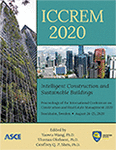International Conference on Construction and Real Estate Management 2020
Defining Vulnerability of Complex Construction Projects from the Wittgenstein Family-Resemblance Philosophy
Publication: ICCREM 2020: Intelligent Construction and Sustainable Buildings
ABSTRACT
In order to understand the general definition of vulnerability in construction management, 50 articles were screened and reviewed from different kinds of construction projects. Besides, content analysis was used in depth, from which 11 core elements of vulnerability were identified. Based on the principle of family-resemblance proposed by Wittgenstein, whose idea is that a complex concept can be understood as a network of overlapping similarities, the four core elements of project characteristics, sensitivity, adaptability, and exposure are regarded as the “flowers” of the sunflower and seven non-core elements such as risk-related, adverse change, potential loss, internal state, robustness, resilience, and complexity are used as “petals” to construct the image of the sunflower model and intuitively express the connotation of the vulnerability of complex construction projects. Then the validity of the model is tested by using relevant authoritative literature. Results shows that four core elements of project characteristics, sensitivity, adaptability, and exposure can be promoted as a common vocabulary for the vulnerability of complex construction projects. This research provides a theoretical reference and practical basis for project risk managers to grasp project characteristics, reduce project vulnerability, and manage large and complex construction project risks.
Get full access to this article
View all available purchase options and get full access to this chapter.
ACKNOWLEDGMENTS
The authors sincerely acknowledge the committee of ICCREM. This research study is funded by the National Social Science Foundation of China (17BGL260).
REFERENCES
Deng, X., Pheng, L.S. and Zhao, X. (2014). “Project system vulnerability to political risks in international construction projects: the case of Chinese contractors.” Project Management Journal, 45(2), 20-33.
Fidan, G., Dikmen, I., Tanyer, A.M. and Birgonul, M.T. (2011). “Ontology for relating risk and vulnerability to cost overrun in international projects.” Journal of Computing in Civil Engineering, 25(4), 302-315.
Field, C.B., Barros, V.R., Mach, K. and Mastrandrea, M. (2012). “Managing the risks of extreme events and disasters to advance climate change adaptation: special report of the intergovernmental panel on climate change.” Journal of Clinical Endocrinology and Metabolism, 18(6), 586-599.
Jenelius, E. (2006). “User inequity implications of road network vulnerability.” Journal of Transport and Land Use, 2(3), 57-73.
Le, Y., Liu, M. and Zhang, B. (2017). “Evaluation of mega projects’ social vulnerability based on intuitionist fuzzy multi-attribute group decision-making.” Science and Technology Management Research, 20(19), 71-77. (in Chinese).
Li, H., Zhang, P. and Cheng, Y. (2008). “Concepts and assessment methods of vulnerability.” Progress in Geography, 27(2), 18-25. (in Chinese).
Liu, W. (2014). “The application of content analysis in the research of public administration.” China Academic Journal Electric Publishing House, 18(6), 93-98. (in Chinese).
Nyström, J. (2005). “The definition of partnering as a Wittgenstein family-resemblance concept.” Construction Management and Economics, 23(5), 473-481.
Qin, X., Li, Z. and Mo, Y. (2016). “A risk and vulnerability ontology for green building projects based on in-depth interview and grounded theory.” China Civil Engineering Journal, 25(8), 120-132. (in Chinese).
Yeung, J.F.Y., Chan A.P.C. and Chan, D.W.M. (2007). “The definition of alliancing in construction as a Wittgenstein family-resemblance concept.” International Journal of Project Management, 25(3), 219-231.
Zhang, H. (2007). “A redefinition of the project risk process: using vulnerability to open up the event-consequence link.” International Journal of Project Management, 25(7), 694-701.
Information & Authors
Information
Published In
ICCREM 2020: Intelligent Construction and Sustainable Buildings
Pages: 538 - 546
Editors: Yaowu Wang, Ph.D., Harbin Institute of Technology, Thomas Olofsson, Ph.D., Luleå University of Technology, and Geoffrey Q. P. Shen, Ph.D., Hong Kong Polytechnic University
ISBN (Online): 978-0-7844-8323-7
Copyright
© 2020 American Society of Civil Engineers.
History
Published online: Oct 14, 2020
Authors
Metrics & Citations
Metrics
Citations
Download citation
If you have the appropriate software installed, you can download article citation data to the citation manager of your choice. Simply select your manager software from the list below and click Download.
